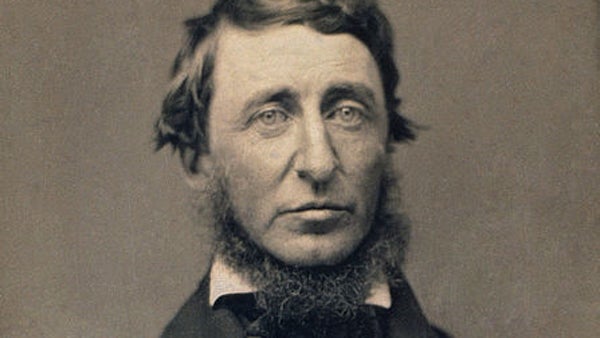Gay marriage licenses: Law versus conscience

Portrait photograph from a ninth-plate daguerreotype of Henry David Thoreau. (National Portrait Gallery, Washington, D.C.)
Bruce Hanes, the Montgomery County Register of Wills who has issued 34 gay marriage licenses in defiance of Pennsylvania law – and who was sued yesterday by the state, which demands that he “immediately cease and desist” – has apparently been channeling Henry David Thoreau.
The famed 19th-century essayist and social activist is perhaps best known for writing “Civil Disobedience,” where he argued that a citizen has a duty to defy unjust laws. Thoreau chose not to pay his taxes, as a way to protest the government’s indulgence of slavery and its prosecution of the Mexican War. As a tax deadbeat, he was briefly imprisoned. He argued in his essay that conscience shoud trump obedience: “The only obligation which I have a right to assume is to do at any time what I think right.”
Needless to say, Thoreau’s dictum was controversial then, as it is now. If every citizen were to decide what laws to obey or defy, and decided to do “at any time’ what they thought was right, clearly we’d have chaos. And yet, who are we to dispute the righteous disobedience of Gandhi and Martin Luther King – both of whom defied laws and legal systems that were patently unjust, both of whom cited Thoreau as a major influence?
I’m obviously not implying that Hanes should be ranked with Gandhi and King in the annals of history, but his decision to grant gay marriage licenses in suburban Philadelphia county is in the same spirit.
Granted, the state (more specifically, Gov. Corbett’s Health Department) was absolutely correct on the law yesterday, when it said in its suit that Hanes has failed to “perform his duties under the Pennsylvania Marriage Law’s definition of the term marriage as a civil contract by which one man and one woman take each other for husband and wife.” The state is right to argue that Hanes’ conduct risks sowing “administrative and legal chaos,” because the gay-married couples might petition for government benefits to which, under state law, they are not entitled.
And Hanes’ original justification was Thoreau 2.0. After conferring earlier this month with his county solicitor, “I decided to come down on the right side of history and the law….There are provisions of the Pennsylvania Constitution that I think are diametrically opposed to the marriage law.” You can see why the state sued him. Yes, Hanes at age 66 is a career lawyer and an upstanding heterosexual family man and an Army vet and an eight-year member of the Lutheran Episcopal ministry, but it’s not up to him to “decide” what the right side of a law is. That’s what courts are supposed to do.
On the other hand – and here’s where the debate gets thorny – where would we be as a nation today if Rosa Parks hadn’t followed her conscience and refused to surrender her bus seat to a white person, as required in 1955 by the laws of Montgomery, Alabama? Or if four conscience-driven black students hadn’t defied a racist North Carolina law by requesting service at a whites-only lunch counter in 1960? Those Jim Crow laws were duly enacted; they were also a flagrant breach of equal rights, as guaranteed by the U.S. Constitution.
In other words, a person of conscience who defies a law should at least be prepared to substantively argue why that law is unconstitutional. Hanes has done this.
Hanes contends that the state’s straights-only marriage law violates Article 1 Section 1 of the Pennsylvania Constitution, which says that “all men are born equally free and independent, and have certain inherent and indefeasible rights.” And Article 1 Section 26 says:”Neither the Commonwealth nor any political subdivision thereof shall deny to any person the enjoyment of any civil right, nor discriminate against any person in the exercise of any civil right.” (Italics mine.)
Thoreau wrote, “If the machine of government is of such a nature that it requires you to be the agent of injustice to another, then, I say, break the law.” Hanes, having consulted the Constitution, chose to rage against the machine. You can decide for yourself the parameters of law and conscience, but I would argue that Hanes has badly miscalculated in only one respect:
By favoring marriage equality, he has staked out “the right side of history” way too early. But sooner or later, the weight of history will bend the state, and Pennsylvania will right its wrong.
——-
Follow me on Twitter, @dickpolman1
WHYY is your source for fact-based, in-depth journalism and information. As a nonprofit organization, we rely on financial support from readers like you. Please give today.

